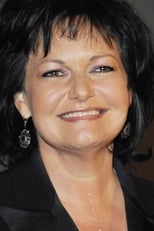Maurane
- Teen actor
Claudine Luypaerts, better known as Maurane (12 November 1960 – 7 May 2018), was a Francophone Belgian singer and actress.
Brought to light in the 1980s with her role as Marie-Jeanne in the second version of the rock opera Starmania, her best-known titles are "Toutes les mamas", "Sur un prélude de Bach" and "Tu es mon autre" (in a duet with Lara Fabian). She was regularly referred to as a "golden voice of francophone song," or having a "velvet voice."
Claudine Luypaerts was born on 12 November 1960 in Ixelles, Brussels, to Guy-Philippe Luypaerts, a composer and director of Académie de Musique of Verviers, and Jeannie Patureaux, a piano teacher. When she was young, she studied the violin for a while, but was put off by all forms of schooling and began to learn to sing and play the piano on her own, before preferring the guitar.
In 1976, she was second in the Visa competition for the show and, the following year, took part in the Lundis d'Hortense, for which she adopted the stage name "Claudie Claude".
In 1979, Maurane took part in the show Brel en mille temps, with Philippe Lafontaine, where she was discovered by the French songwriter Pierre Barouh. Founder of the Saravah label, he produced her first singles which were released starting in 1980 under the pseudonym "Claude Maurane". The latter is a reference to the director Francis Morane who worked on Starmania. However, it is spelled slightly differently in order to avoid confusion with the Bob Morane comic strip,[9] even though she is sometimes credited under this spelling.
The first singles - "J'me roule en boule" (1980), "Fais soleil" (1982), "T'as pas la pêche" (1984), "Moi l'argent, toi jeune" (1985) - did not meet with much success. She later got a string of small contracts, singing in the street or in cafés and to be a backing singer, notably for Viktor Lazlo, Jo Lemaire or Philippe Lafontaine.
Her career only really took off in 1983 when she first performed at the Sentier des Halles in Paris. The show's success allowed her to record her first album, Danser, produced by Saravah, Éditions 23 and Franc'Amour, which was released in 1986.
In 1988, Michel Berger cast her in the role of Marie-Jeanne, created in 1978 by Fabienne Thibeault. She sang in the second version of the rock opera Starmania, which toured for six months with Renaud Hantson, Sabrina Lory, Wenta, Martine St. Clair, Peter Lorne and the brothers Norman and Richard Groulx. Performing this role at the same time as her singing career proved to be difficult for her, leading her to suddenly stop performing in the rock opera.[10] She was replaced by Réjane Perry for the rest of the tour.
Her second album, Maurane, was released in 1989 on Polydor and proved to be a success, selling 150,000 copies. The album contains one of her most popular songsː "Toutes les mamas," and its success led her to perform at the Olympia then on an international tour that ended in Japan. In July 1989, Maurane was awarded both the Radio France Internationale's female Octave, and the Festival d'été de Québec award. ...
Source: Article "Maurane" from Wikipedia in English, licensed under CC-BY-SA 3.0.
Acted in
Maurane - Olympia 1999
2021
The Red Collar
2018
as La patronne
Les Enfoirés - Les Enfoirés en chœur de 1985 à aujourd'hui
2014
Get Well Soon
2014
as Françoise
Les Enfoirés 2013 - La Boîte à Musique des Enfoirés
2013
Départ immédiat
2012
as Self
Les Enfants de la Pop 80's
2012
as Self (archive footage)
My Afternoons with Margueritte
2010
as Francine
Les Enfoirés 2010 - Les Enfoirés... la Crise de Nerfs
2010
Maurane - La vie en rouge
2009
as Self
Bulles de Vian
2009
as Self
Les Enfoirés 2008 - Les secrets des Enfoirés
2008
Les Enfoirés, 15 ans d'Enfoirés
2005
Royal Palace
2005
as Maurane
Maurane - Master Serie.
2005
Maurane - L'heureux Tour
2004
Autour de la guitare
2003
Lara Fabian : En Toute Intimité
2003
Solidarité inondations
2003
as Self
Les Enfoirés 2002 - Tous dans le même bateau
2002
Star Academy
2001
as Self
Les Enfoirés 2001 - L'odyssée des Enfoirés
2001
Les Enfoirés 2000 - Enfoirés en 2000
2000
Les Enfoirés 1999 - Dernière édition avant l'an 2000
1999
Marie's Counter
1998
as Joëlle
Christmas at Bunny's
1997
Les Enfoirés 1996 - La Soirée des Enfoirés
1996
Taratata
1993
as Self
Téléthon
1987
Victoires de la musique
1985
as Self
Le Grand Échiquier
1972
as Self
































